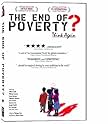I'm not really sure why those who made "The End of Poverty?" felt compelled to include a question mark in their title, since around 90% of the movie is devoted to defining the problem and only about 10% to offering solutions.
For much of the movie, director Philippe Diaz and narrator Martin Sheen keep hitting us with a litany of shocking and depressing statistics: that over 9,000,000 people die of starvation each year, that millions around the world earn less than a dollar a day, and that 60 to 80 million people work for nothing but room and board, making them virtual slaves in a 21st Century world. And that's just for starters. And just as you're about ready to throw in the towel and declare there's no hope for the world, the interviewees begin exploring possible answers (a fairer tax structure, returning land ownership to indigenous peoples, etc.), but it still seems an insurmountable task overall.
On an instructional level, the movie traces the roots of modern poverty to the colonial era that began with the discovery of America, when countries - and now mega-corporations with no moral compass beyond the bottom-line - could exploit someone else's resources and amass huge stores of wealth at the expense of the lower classes. And that doesn't even include the robbing of the culture and the feeling of self-worth from the indigenous peoples of these lands.
Diaz shows how the "haves" in the Northern Hemisphere have built and continue to build their fortunes primarily on the backs of the "have-nots" in the Southern Hemisphere. He interviews both economic theoreticians and common folk struggling for survival in both South America and Africa to drive home his point. He provides example upon example of how the policies of First World nations - neo-liberalism, unfettered free trade, multinational corporatism - have devastated the economies and peoples of the Third World.
It's a depressing experience sitting through this film, but the shards of hope it provides towards the end do provide some comfort. And you might even be inspired enough to rouse yourself off the sofa and work on doing something about the problem. Now, if only anyone knew what that solution was.














